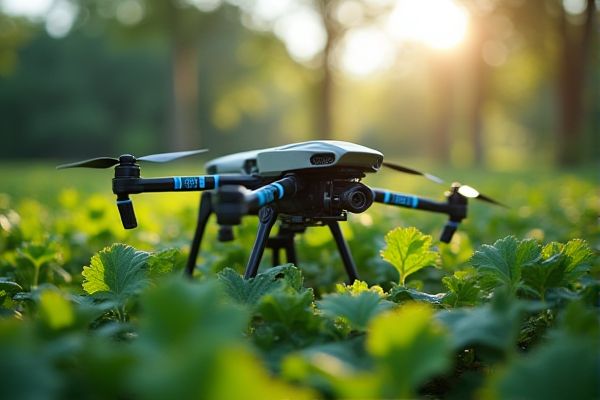
Artificial intelligence enhances sustainable agriculture by optimizing resource use and increasing crop yields. Advanced algorithms analyze soil health, weather patterns, and crop growth, facilitating precision farming techniques. AI-driven tools assist farmers in minimizing pesticide and fertilizer application, promoting environmental health. Implementing AI technologies leads to better decision-making and more efficient management of agricultural practices.
AI usage in agriculture sustainability
Precision Farming
AI in precision farming enhances agricultural sustainability by optimizing resource use and increasing crop yields. For instance, tools like soil sensors analyze data to determine the exact amount of water and nutrients needed, reducing waste. Farm management systems can predict pest outbreaks, enabling timely interventions that minimize pesticide use. The integration of AI technologies can lead to more resilient farming practices that benefit both the environment and economic viability.
Crop Monitoring
AI offers significant potential for enhancing sustainability in agriculture, particularly through crop monitoring. Tools such as satellite imagery and drones can provide real-time data on crop health, allowing farmers to make informed decisions. For instance, institutions like NASA utilize advanced algorithms to assess vegetation indices, which can indicate moisture levels and plant health. This technology can lead to increased yields and reduced resource waste, ultimately benefiting both farmers and the environment.
Resource Optimization
AI can significantly enhance resource optimization in agriculture sustainability by analyzing vast amounts of data to improve crop yields. For instance, precision farming technologies use AI algorithms to target specific areas for irrigation or fertilization based on soil health data. This can lead to reduced water usage and minimized input costs, benefiting farmers economically. By incorporating AI into agricultural practices, institutions like the Agricultural Research Service may find ways to develop more resilient farming systems.
Pest and Disease Prediction
AI can enhance agricultural sustainability by providing accurate pest and disease predictions, enabling farmers to take preventive measures. For example, using machine learning algorithms, tools like PlantVillage can analyze environmental data to forecast potential pest outbreaks. By implementing these predictions, farmers may reduce pesticide usage, leading to safer and more sustainable farming practices. This proactive approach not only conserves resources but can also improve crop yields and overall farm profitability.
Weather Forecasting
AI usage in agriculture sustainability can enhance crop yields by analyzing weather patterns and soil conditions. Implementing AI-powered weather forecasting tools allows farmers to make informed decisions about planting and harvesting times. For example, institutions like the USDA are exploring AI to provide real-time recommendations tailored to specific crops. This technology opens up possibilities for optimizing resource use and minimizing waste in farming practices.
Soil Health Analysis
AI can enhance agricultural sustainability by optimizing soil health analysis, leading to better crop yields and resource management. Technologies like machine learning can predict soil nutrient levels and moisture content, allowing farmers to make informed decisions. For instance, a tool like SoilGrids provides valuable data on soil properties to improve farming practices. Implementing such AI solutions may reduce chemical inputs and improve overall ecosystem balance.
Yield Prediction
AI has the potential to enhance sustainability in agriculture by improving yield prediction accuracy. By analyzing historical yield data and environmental factors, machine learning algorithms can identify optimal planting times and crop varieties. For instance, institutions like the University of Illinois are exploring AI applications to optimize crop management strategies. This approach can increase efficiency, reduce resource waste, and ultimately contribute to more sustainable farming practices.
Farm Automation
AI can enhance agricultural sustainability by optimizing resource usage, such as water and fertilizers, leading to less waste and lower costs. For example, farm automation technologies like precision irrigation systems can significantly reduce water consumption while boosting crop yields. With data-driven insights, farmers can make informed decisions on planting schedules and harvest timing, improving efficiency. This potential for increased productivity and sustainability presents a considerable advantage for modern agricultural practices.
Supply Chain Optimization
AI can enhance agricultural sustainability by improving crop management and minimizing resource waste. For example, predictive analytics can help farmers forecast yields and optimize planting schedules, leading to more efficient land use. In supply chain optimization, AI algorithms can analyze data to streamline logistics, reducing costs and environmental impact. The integration of these technologies may yield significant advantages in food production and distribution efficiency.
Environmental Impact Assessment
AI can enhance agricultural sustainability by optimizing resource use and increasing crop yields. By employing predictive analytics, farmers can evaluate environmental impact, such as soil health and water usage, leading to more sustainable practices. For instance, the integration of AI with platforms like Precision Agriculture enables farmers to monitor crop conditions in real-time. This technology can potentially reduce chemical runoff, benefiting both the environment and agricultural productivity.
 techknowy.com
techknowy.com